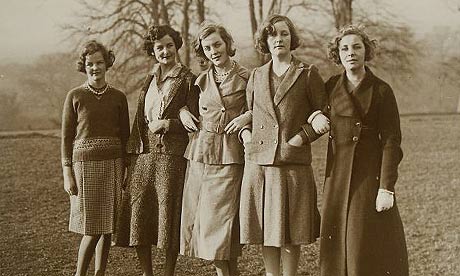It’s hard to go into these novels already knowing rather a lot about the Mitfords, and especially as a worshiper of all things Jessica. Nancy Mitford mined her family and friends for characters and plots–the novels contain quite a bit of autobiographical fictioneering. But, while there are a number of felicitous, funny moments (the child hunt; anything said by Jassy–the Jessica stand-in–or Victoria; Lady Montdore going once in the morning and not needing to be let out all day like a dog; Uncle Matthew shaking Cedric like a rat), one can’t help feeling (um, knowing) that there’s a more interesting story not being told, and wonder why Nancy chose to relate or to suppress what she did.
After a brief lunchtime chat with Karl about psychoanalytic crit theory, I wonder why Nancy chose the pink-champagney, fey view of these aristocratic families in Cold Climate (1949), the country eccentric version of them in Pursuit of Love (1945)–and omitted all the things that disrupted the light, humorous mood of both–but then chose to narrate both stories from the pov of an outsider by wealth, education, and disposition (the shy, dowdy cousin Fanny, daughter of the disreputable Bolter), whose own story occurs only in fits and starts, interrupted and upstaged by the lives of the characters she narrates. Mitford practically invites you to wonder about the concealments, the lives not guessed at–to read her novels as facades. She makes you wonder what narrative, personal, or political aims can be served by such extremely elided accounts of her own family life–and why, if she chose to elide them, she wrote about her family in the first place, and why she made it fiction.
Moreover, one has to consider that Nancy was only too aware that she was writing for an audience that already knew what she wasn’t saying–not just the Bright Young Things and the people she’d danced or dined with, but anybody who could pick up a newspaper, because the intimate lives of her siblings had started appearing in the scandal sheets when she was in her twenties. She was a celebrity from a notorious celebrity family. So, when she combined the antics of her sisters Diana, Jessica, and Deborah (notably, the other three writers of the family!!!) with her own, to make the character of Linda, what was she trying to tell us about family, representation, truth, public knowledge, and fiction? I don’t know! While I didn’t love these novels, and they’re not the kind of thing I’d want to read by anybody else, the cleverness and the secrecy do stick and will make me think for a long time.
Read in 2010
